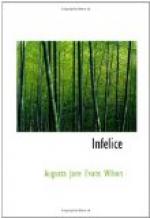During Thursday morning the minister lay upon his library sofa, while Regina read aloud for several hours, but in the afternoon, receiving a summons to attend a sick man belonging to his church, he persisted in walking to a distant part of the town, to discharge what he considered a clerical obligation.
In vain Regina protested, assuring him that the heat and fatigue would completely prostrate him. He only smiled, patted her head, and said cheerfully as he put on his hat:
“Is the little girl wiser than her guardian? And has she not yet learned that a pastor’s duty knows neither heat nor cold, neither fatigue nor bodily weaknesses?”
“I am so glad Mrs. Lindsay will come to-morrow. She can keep you at home, and make you take care of yourself.”
Holding his sleeve, she followed him to the front door, and detained him a moment, to fasten in the button-hole of his coat a tuberose and sprig of heliotrope, his favourite flowers.
“Thank you, my dear. You have learned all of Elise’s pretty petting tricks, and some day you will be, I hope, just such a noble, tender-hearted woman. While I am gone, look after the young guineas; I have not seen them since yesterday. I shall not stay very long.”
He walked away, and she went out among the various pets in the poultry yard.
It was late in August, but the afternoon was unusually close and warm, and argosies of frail creamy clouds with saffron shadows seemed becalmed in the still upper air, which was of that peculiar blue that betokens turbid ether, and hints at showers.
About sunset Regina rolled the large easy chair out on the verandah at the west of the library, and, placing a table in front of it, busied herself in arranging the pastor’s evening meal. It consisted of white home-made lightbread, a pineapple of golden butter, deftly shaped and printed by her own slender hands, a glass bowl filled with honey from the home hives—honey that resembled melted amber in cells of snow, a tiny pyramid of baked apples, and a goblet of iced milk.
Upon a spotless square of damask daintily fringed she placed the supper, and in the centre a crystal vase filled with beautiful Cloth of Gold and Prince Albert roses, among which royal crimson and white carnations held up their stately heads and exhaled marvellous fragrance. Upon the snowy napkin beside the solitary plate, she left a Grand Duke jasmine lying on the heart of a rose-geranium leaf.
“Has he come?” asked Hannah, throwing wide the Venetian blinds.
“Not yet; but he must be here very soon.”
“Well, I am going to milk. Dapple has been lowing these ten minutes to let me know I am behind time. I waited to see if a cup of tea would be wanted, but it is getting late. If he should ask for it, the kettle is boiling, and I guess you can make it in a minute. I have lighted the lamp and turned it down low.”
She went toward the cattle-shed, swinging her copper milk-pail, which was burnished to a degree of ruddy glory beautiful to contemplate, and which, alas! is rarely seen in this age of new fashions and new-fashioned utensils.




